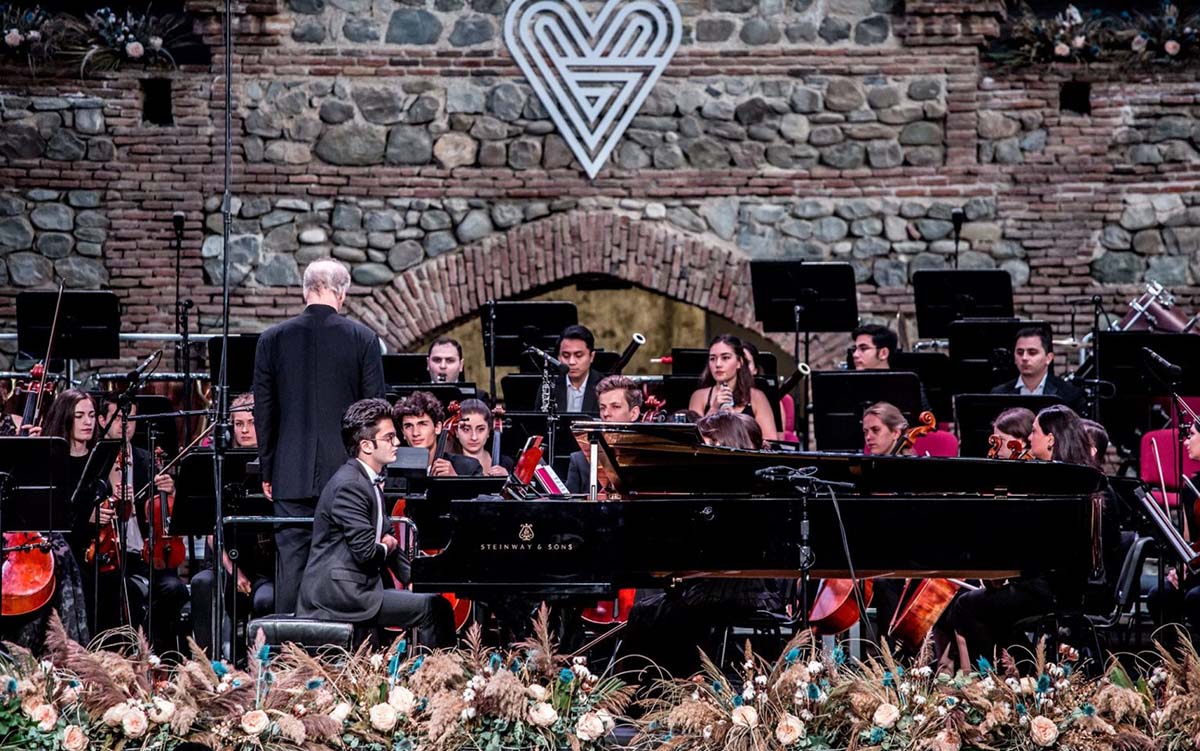
‘In the Name of Music’: Georgia’s annual celebration of art, wine and harmony in Tsinandali

Tsinandali, Georgia may not be a place many have heard of, but it holds immense historical and cultural value for the country, and serves as one of its most renowned centers for artistic, literary, musical, and winemaking talents. Located in Kakheti region, the heart of Georgia’s winemaking region, the village of Tsinandali was owned by Prince Alexander Chavchavadze, a 19th century aristocratic poet, man of letters, and public benefactor known as the “father of Georgian Romanticism”, who transformed his inherited estate in a cultural hub of learning, art, science, and music. Transforming his estate into a veritable botanical garden, which itself was surrounded by some of Georgia’s oldest and best vineyards, the Tsinandali Estate was turned into a region salon that hosted luminaries as Russian writers Alexander Lumontov and Alexander Pushkin, as well as the French writer Alexandre Dumas, writes Michael Rossi.
Throughout much of the 19th century, the Tsinandali Estate was known as a cultural oasis of literary discussion, artistic expression, and viticulture, and since 2007, the Silk Road Group, a private investment organization located in Georgia, has heavily invested in the restoration of the Tsinandali Estate, with the intention of returning it to its 19th century as a center of artistic and cultural sharing. The Group has been active in marketing Georgia as location for retail, tourism and hospitality, and entertainment, with the annual Tsinandali Festival as one of its most popular events.
Today, the estate is home to the Tsinandali Festival, a 10-day classical music festival that invites some of the world’s most famous performers, conductors, composers, music scholars and artists from the Caucasus, the neighboring countries from the former Soviet Union, and the wider region “to explore the world of music and advance their musical education through professional seminars and masterclasses.” As it is currently enjoying its fifth consecutive year between September 30 and October 9, the Festival has emerged as a bridge for diplomatic and cultural exchanges among the countries of the Caucasus and the wider region of the former Soviet Union. Next year in 2024, the Berlin Philharmonic will perform there, showing its rise in status and prominence within the musical community.
While functioning solely and exclusively to promote dialogue, peace, and cooperation “in the Name of Music”, the Festival’s civic-orientation stands in stark contrast against a backdrop of political instability across some parts of the former Soviet Union, such as Ukraine and Azerbaijan. A perfect example of this commitment to inclusion, the Festival hosts the Pan-Caucasian Youth Orchestra, which includes over eighty young musicians from the Caucuses region and is led by Music Director Gianandrea Noseda who has been Resident since its first edition in September 2019. This year, the orchestra has brought young musicians from Ukraine, Russia, Georgia, Azerbaijan, Armenia, Turkey, Kazakhstan and Turkmenistan to play classical music pieces, bringing people closer together through music and cultural cooperation.
As one of the flagship projects of the Silk Road Group, both the Festival and the town of Tsinandali have been meticulously highlighted as Georgia’s historical connection with the fabled Silk Road that linked civilizations from China in the East to the Byzantine Empire in the West and across Central Asia. This Central Asian connection is not only reflected in the annual lineup of artists, musicians, and performers from the region, but also in one of the Silk Road Group’s chief partners, Yerkin Tatishev, chairman of the Singapore-based Kusto Group, who was one of the Festival’s founders and has long championed the event as an opportunity to present the region in a more positive light to the wider world beyond political news.
Cultural events like the Tsinandali Festival can serve as tools for soft power and diplomacy, as Georgia is quickly becoming a major destination for travel, business, and entrepreneurship. By simply learning about Georgia’s home-grown winemaking alongside historical centers of learning and innovation like the Tsinandali Estate, Georgia can take pride in knowing its own history, culture, traditions, and accomplishments are similar in style of the vineyards of northern Italy, the salons of Paris, and the music centers Vienna.
What is more, the Festival offers participation to Georgia’s wider neighborhood that fosters the type of collaboration and cooperation not just praised in Western European circles, but also hearkens back to the multicultural harmony of the Soviet period, and how this diversity can promote peace in regions that have often conflicted. This is particularly necessary in light of recent events in Ukraine and Azerbaijan that both deepened political divides between governments in Moscow and Kyiv, and Baku and Yerevan, but have also seeped into seemingly non-political engagements like athletic matches where players have either refused to engage with team members from the other side, or simply refuse to compete altogether. That the Festival remains dedicated to the spirit of dialogue through art, music, and collaboration, it reflects the essence of what the Silk Road of history was: a conduit of cultural exchange, communication of ideas, a harmony of tastes and flavors, and an integration of peoples.


